CCMA-324: Continental Divide Alpine Backpacking
Course Code: CCMA-324
Start Date: 7/5/23
End Date: 7/12/23
This backpacking course takes place in the Rocky Mountains and focuses on the art of traveling light, exploring the natural world and becoming a high functioning team. During the course, you can expect to travel on and off trail and over wooded and alpine terrain at 9,000 feet or higher, which can be rough, steep and exposed. Learn smart and efficient backpacking and alpine travel techniques as well as Leave No Trace camping and travel skills, outdoor cooking techniques, basic first-aid, map and compass use, route finding and how to use an ice axe if necessary. Backpack through the alpine environment and attempt a peak ascent. As the course progresses and your skills and experience increase, your Instructors will turn more and more responsibility over to you and your crew.
Sawatch Range, Colorado
The Sawatch sub-range of the Colorado Rockies is home to Colorado’s two highest peaks: Mt Elbert (14,439’) and Mount Massive (14,429’). The range is known for expansive, rolling alpine terrain and multiple high peaks, and encompasses the headwaters of the Arkansas River. The source of the name is somewhat disputed but some source it to Ute words meaning “green place” or “blue water.” These regions are within the ancestral lands of the Núu-agha-tʉvʉ-pʉ̱ (Ute) nation.
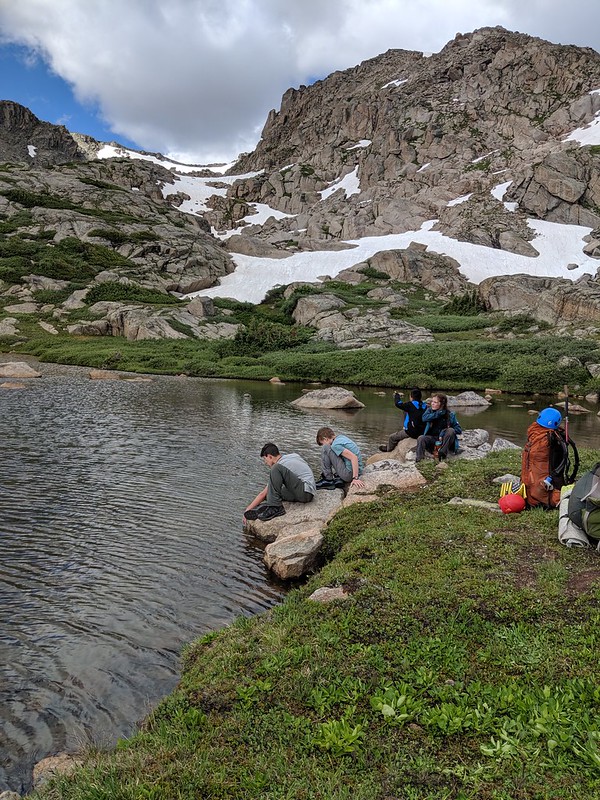
Photo: Terence Copeland |📍Núu-agha-tʉvʉ-pʉ̱ (Ute) lands
Leadville Mountain Center, Colorado
Colorado Outward Bound’s 600-acre property at the base of Mount Massive. Our base camp encompasses mountain streams, wild plants, fields and forests. Lake Fork Creek (that runs into the headwaters of the Arkansas River) runs near the east of our property and the Colorado Trail borders us to the west. If the timing is right, colorful wildflowers will brighten the trails through the LMC. You might share camp with elk, deer, chipmunks and myriad other wildlife. This region is within the ancestral lands of the Núu-agha-tʉvʉ-pʉ̱ (Ute) nation.
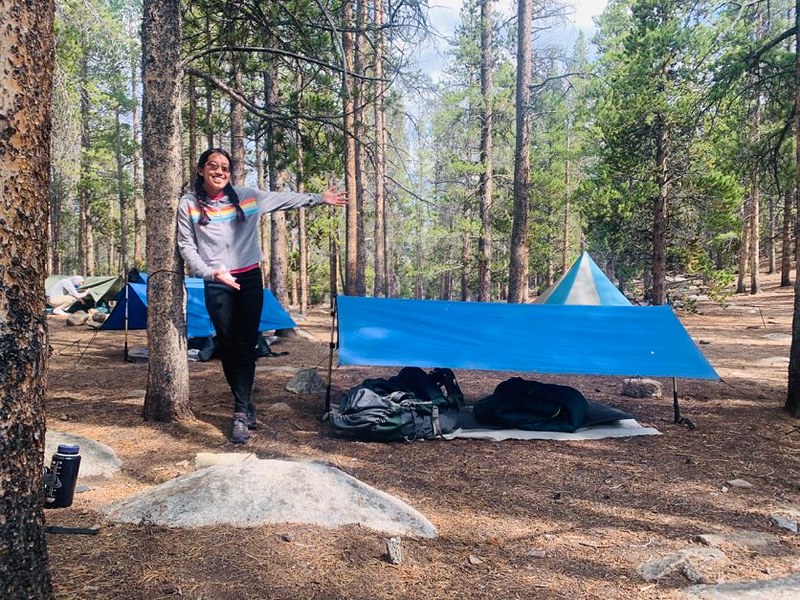
📍Núu-agha-tʉvʉ-pʉ̱ (Ute) lands
Rocky Mountains, CO
The Colorado Rockies is home to the most high peaks in the lower 48 states, with hundreds of iconic mountains standing over 13,000 and 14,000 feet tall. The region is characterized by dense pine forests and rocky alpine ecosystems. Students will enjoy clear blue glacial lakes, fields of wildflowers, waterfalls, and striking rock formations. If they are observant, students may spot wildlife like elk, mountain goats, moose, marmots, pikas and eagles. These regions are within the ancestral lands of of the Núu-agha-tʉvʉ-pʉ̱ (Ute), Cheyenne, Arapaho, Očeti Šakówiŋ (Sioux), Eastern Shoshone, Jicarilla Apache, and Pueblos nations.
What is a land acknowledgment?
At the Colorado Outward Bound School, we include land acknowledgments in our work as a formal way to recognize and respect the traditional territories and Indigenous Peoples as stewards of the land. It is important to understand and acknowledge the comprehensive past, present, and future of the places we travel and to seek to understand our role therein. To recognize the land is an expression of gratitude and appreciation we give to the Indigenous Peoples who have been living and working on the land from time immemorial. Read more about land acknowledgments at Outward Bound here.
Alpine Backpacking
Alpine Backpacking will develop a foundational outdoor skillset for students allowing comfortable living during course. Traveling mostly above treeline, students will carry everything they need - food, shelter, clothing and gear – allowing them to go deep into the mountains where few people can reach. Backpacking provides a sense of freedom, allowing students to eat when hungry, set up camp when tired, and exercise complete control over what is accomplished each day. The simplicity of backpacking gives students the opportunity to focus both internally on their own thoughts, as well as externally to connect deeply with others as they talk, sing, play games and spend time together without distraction. With the Rocky Mountains as a backdrop, students are introduced to backpacking with lessons in basic travel and camping techniques. As this section progresses, students learn Leave No Trace techniques, map and compass navigation, camp craft, and obtain an understanding of the area’s human and natural history.
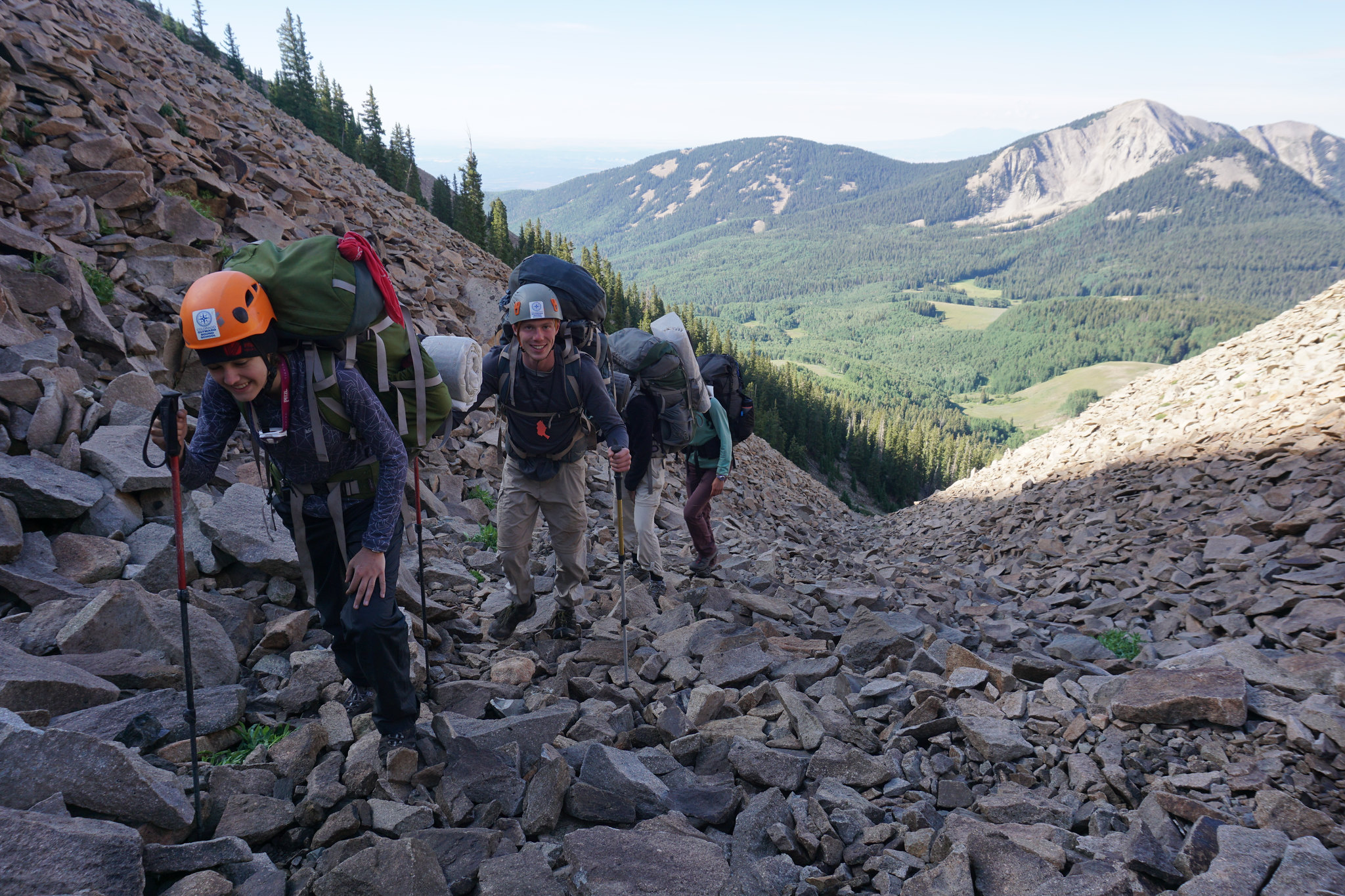
Photo: Dave Erbe |📍Núu-agha-tʉvʉ-pʉ̱ (Ute) lands
Guided Reflection and Transference
At Outward Bound we believe there is no learning without reflection. Throughout course, you will be prompted to reflect on what you’re experiencing on course, and what it means in the greater context of your life. Sometimes this is a journaling exercise, sometimes a group sharing experience, and sometimes a moment of solitude to sit and think. You spend focused time toward course progression end exploring how your new knowledge, skills and attributes can apply to your life after course.
High Ropes Course
Swaying in the lodgepole pine trees of the Leadville Mountain Center, our High Ropes Course offers individual challenges to unlock the potential in each group member. The Ropes Course has an array of elements and many opportunities to return to the ground, allowing students to choose the right amount of challenge for them. Traveling through the tree 40 feet above the ground while wearing harnesses and safety gear, students rely on their crewmates for support as they navigate exciting obstacles like swinging bridges and rope nets. Instructors and group members are always close by to encourage and help one another and to ensure safe transfers from one element to the next.
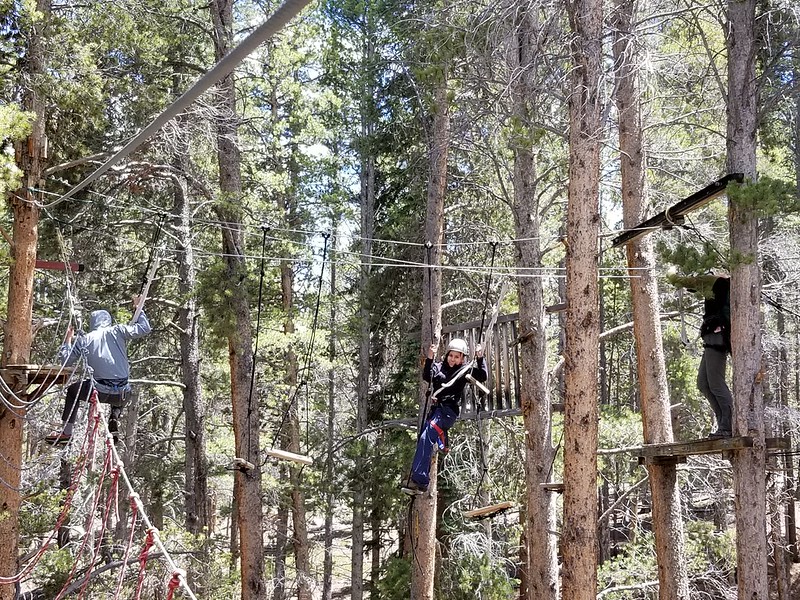
Photo: Anthony Capristo |📍Núu-agha-tʉvʉ-pʉ̱ (Ute) lands
Solo
Solo is a time when you’ll get the opportunity to spend time alone during course. With sufficient food and equipment, your Solo will be a chance to reflect on your course experience, journal, and connect with nature. Depending on your course length and environmental factors, Solo can range from 30 minutes to an overnight experience. You will not travel during this time and your Instructors may check on you occasionally. Your solo site will be close enough to your Instructors in case of emergency, but far enough removed to enjoy solitude. Many students are initially nervous about solo, but later recall it as one of the highlights of their course.
Peak Attempt
Peak Attempts present an opportunity for challenge, teamwork, and the need to pull together all of your learned skills for success. Your expedition will include at least one peak attempt. Peak attempts are major enterprises and typically require early morning starts and can take all day to complete. Weather, or other factors including group dynamics and physical readiness, may preclude even an attempt to ascend a peak.
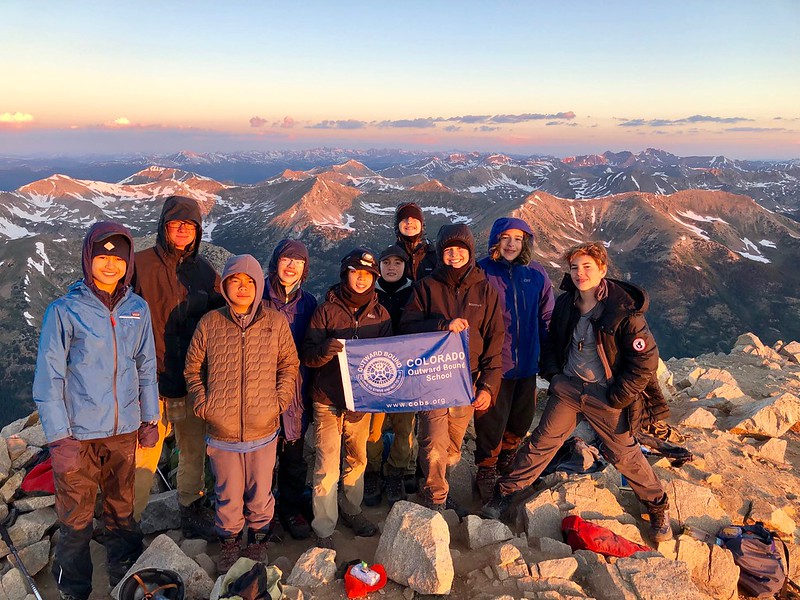
Photo: Naomi Winard |📍Núu-agha-tʉvʉ-pʉ̱ (Ute) lands
Service
Service is a pillar of the Outward Bound experience. On each course, students learn to practice intentional service to themselves, to others and to the environment. This may look like practicing self-care or supporting a crewmate who is having a hard day. Participants also learn to Leave No Trace ethics, practicing service to the environment by preserving and respecting the fragile ecosystems they encounter. Students experience firsthand the social and emotional benefits of acts of service. They are encouraged to bring this ethic of care to their life back home.
Ground Initiatives
To develop skills in problem-solving and teamwork, your Instructors will progress your group through a series of fun and physically engaging outdoor activities. Students will be actively engaging with the physical environment and each other to achieve goals. You’ll discuss how different styles of leadership and communication lead to different outcomes. Instructors will match appropriate initiatives to your group’s needs. Group reflection will focus on core course components like belonging, courage, and transferring skills and lessons learned to life back home. You group will then take your newfound skills and insight to the low ropes course.
Low Ropes
Together the group will navigate obstacles like logs, rope swings, and platforms just a few feet above the ground to practice leadership and problem-solving. Students gain confidence as they explore different leadership styles and learn the importance of listening and supporting one another. Reflection after each activity helps students connect their experiences to real-world scenarios, facilitating educational transference to the classroom and beyond. The Low Ropes course deepens the group’s ability to communicate and work cohesively.
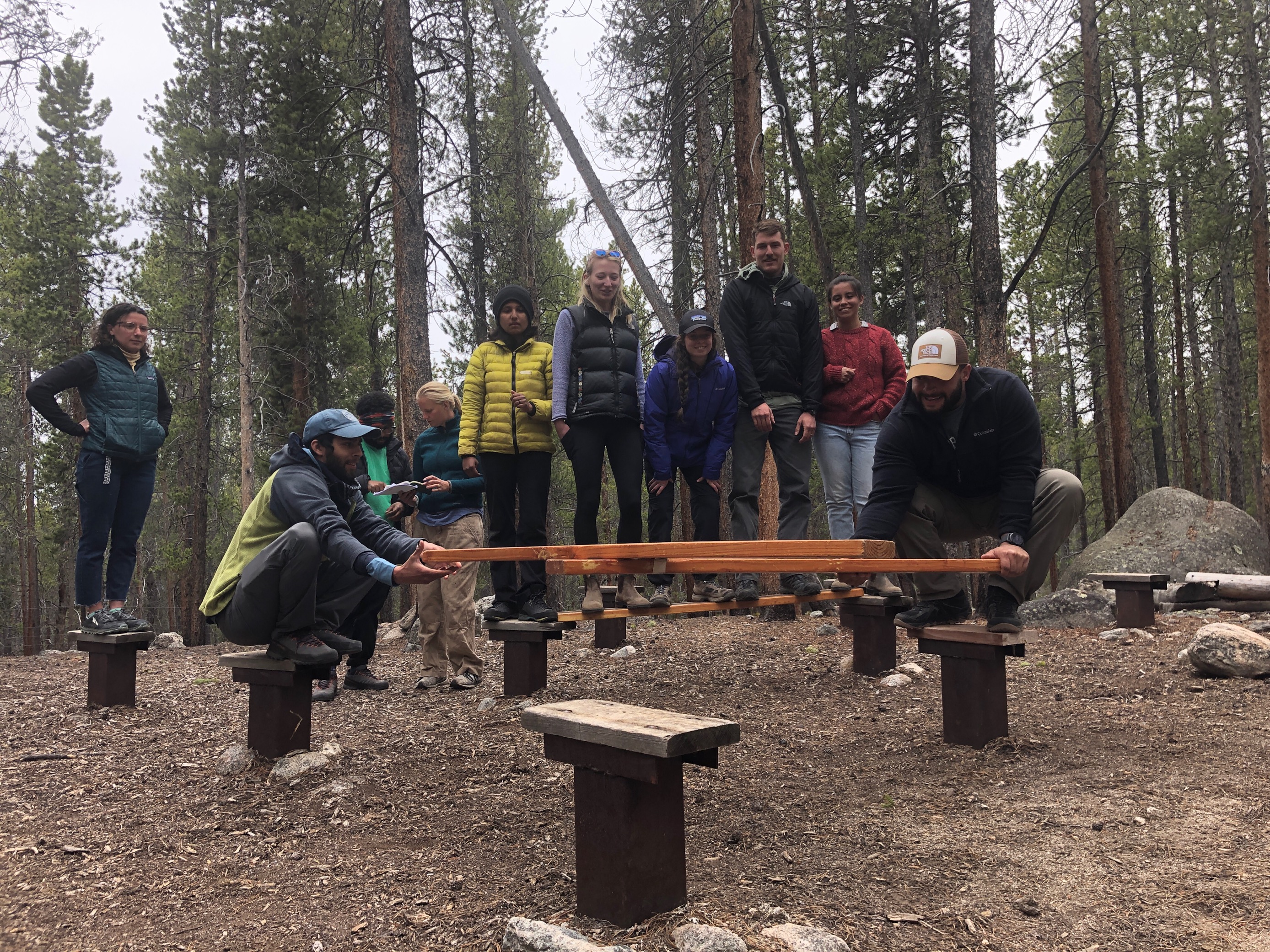
Photo: Leslie Spinelli |📍Núu-agha-tʉvʉ-pʉ̱ (Ute) lands
The following is an example of what your itinerary may look like. Your actual course plan will vary according to weather, your group’s skills and abilities, and Instructor preferences.
Day 1: Course Start, gear distribution, & backcountry sleeping
Day 2: Low ropes & initiatives, High ropes course, preparation for backcountry travel
Day 3-6: Backpacking, group development, Peak Attempt, Solo experience, & adventure
Day 7: Deissue gear & closing ceremony
Day 8: Student depart and travel home
Our expeditions help students grow into the best version of themselves. We use adventure in the outdoors to help students discover their strengths and build authentic connections with their peers. Compassion for oneself and others is foundational to the Outward Bound experience. As students develop outdoor skills, they also gain confidence and leadership tools that will last a lifetime. Course outcomes include:
- Belonging – students form deep connections founded upon respect, inclusion, and compassion
- Reflection – students learn self-awareness and practice empathy towards others
- Physical Engagement – students develop awareness and confidence in their bodies
- Courage – students develop the confidence to speak up for themselves and persevere through challenges
Watch to Learn More
Tuition
You can pay your tuition online through your Applicant Portal or make the payment over the phone by calling 720-381-6589.
If your payment is not received by the due date listed in your Enrollment Email and on your Applicant Portal, you will risk losing your spot on course and your $500 deposit. Please review our Admissions and Cancellation Policies.
Travel Insurance
Airfare, travel costs, and non-refundable tuition payments are expensive. Insurance to protect your trip and course is strongly encouraged. We recommend insuring these costs from the third-party provider InsureMyTrip. This provider has coverage options that include travel costs and non-refundable tuition costs. For more information and to receive a free quote, click here.
Click here for COBS COVID-19 Program Practices